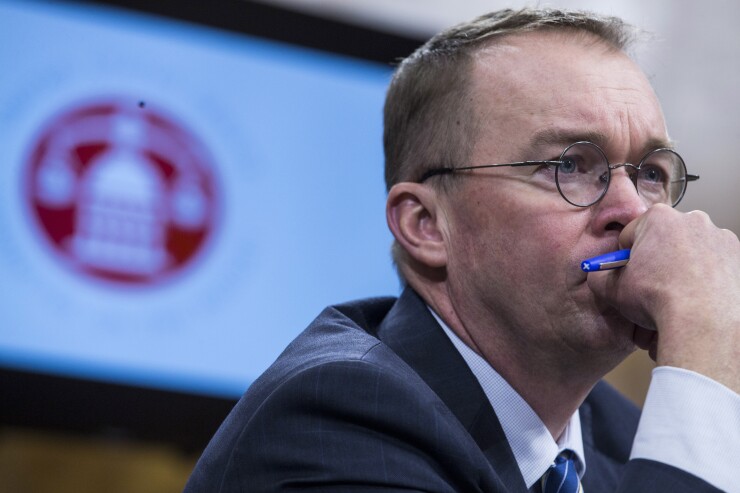The union representing employees at the Consumer Financial Protection Bureau is already battling plans by acting Director Mick Mulvaney to restructure the agency — and is preparing for a bigger fight if he moves to cut jobs.
The union has not yet heard that there are concrete plans for layoffs, called “reduction in force” in government-speak, but it is worried such efforts are in the works.
"NTEU will fight legislative and agency proposals that would starve the CFPB of the resources and personnel necessary to do the job as required by statute," said Tony Reardon, president of the National Treasury Employees Union. "The agency should not undercut that mission by pressuring employees to leave or refusing to use the revenue it is entitled to use in order to force a downsizing."

The union has already stalled some of Mulvaney’s other plans. He announced in February that he wanted to move the fair-lending office out of the division of supervision and enforcement and effectively downgrade it to part of the director's division. But Mulvaney said Wednesday he is still
The union was only formerly notified of the changes in April, and said the process would take several months, according to Reardon.
"Part of that process is engaging management in negotiations regarding the implementation of its reorganization plans which helps make the reorganization a smoother process for employees and the agency," he said.
The union's involvement adds another layer of bureaucracy as Mulvaney seeks to put in place major policy changes. Though Mulvaney has not said he is planning layoffs, the union appears to expect such a move.
Observers agree one is likely, given the reduced role Mulvaney envisions for the agency.
The CFPB is "considerably narrowing its footprint in the market," including a pullout from oversight of student loan servicing, said Isaac Boltansky, director of policy research at Compass Point Research & Trading.
How much impact the union negotiations would have remains unclear. Federal labor law requires federal employee unions receive prior notice of changes in working conditions, so it is standard practice for an agency to brief employee unions on forthcoming organizational changes that affect front-line employees, according to Reardon.
He said CFPB examiners, lawyers, accountants and auditors "have carried out their duties with professionalism," including many bank examiners who were involuntarily transferred to the CFPB from other agencies such as the Federal Deposit Insurance Corp. and the Office of the Comptroller of the Currency.
Union negotiations could take time and the clock is already ticking on Mulvaney's job as interim CFPB director. He is moving quickly to enact changes in part because of a June 22 deadline for President Trump to nominate a permanent CFPB director, who then must be approved by the Senate. (If a nominee is not announced prior to that date, Mulvaney can no longer serve as acting director. If a nominee is announced as expected, Mulvaney can remain as long as the nomination is pending.)
The union has laid its cards on the table by describing what it will do in the event that layoffs occur.
"NTEU would seek other options for workers, including reassignments to continuing positions; career transition assistance; retirement counseling; time to search for other jobs outside of the agency; and voluntary early outs and separation incentive payments," Reardon said.
A lingering question ahead is whether Mulvaney will request less funding for the CFPB — a signal that layoffs are coming — or not. Mulvaney requested
Though some CFPB employees fear reductions ahead, so far Mulvaney has made plans to increase the CFPB's payroll, proposing to create a new office of cost-benefit analysis that would be staffed by a team of economists.
He has also added at least a dozen political appointees that shadow the heads of each CFPB division.
It is unclear what role the union will play in those additions. Political appointees and most CFPB senior management are not covered by the union. Of the CFPB's roughly 1,700 employees, about 1,100 are in the union.
The union is weighing in on some of the broader changes such as Mulvaney's attempts to get lawmakers to enact other reforms including tying its funding to appropriations.
"NTEU believes that CFPB funding should remain out of the appropriations process, allowing the agency to maintain its independence," Reardon said.





